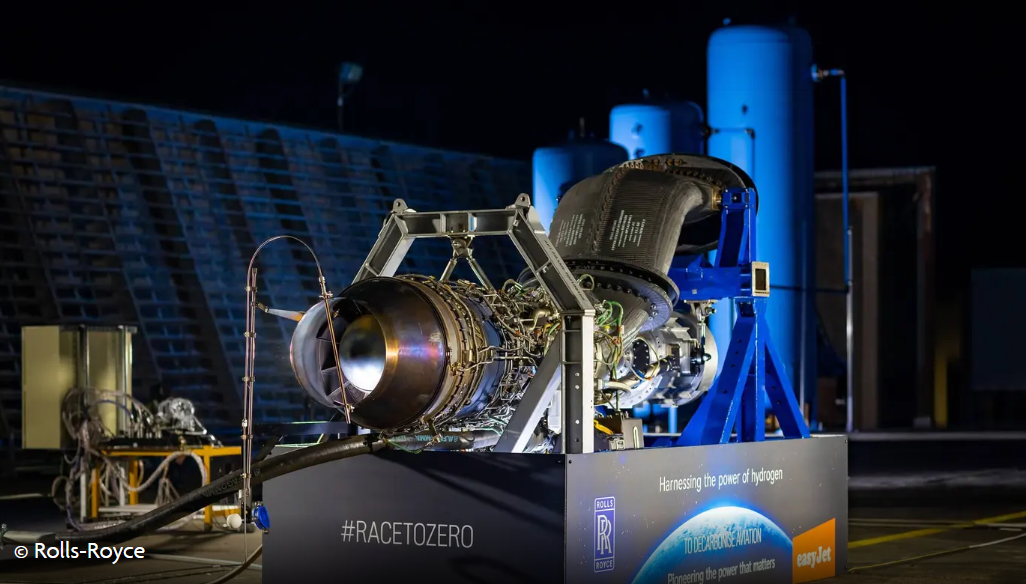Rolls-Royce and easyJet have today (November 28) revealed they have reached a new milestone in the development of aviation with the ‘world’s first’ run of a modern aero engine on hydrogen.

Conducted on an early concept demonstrator on the ground, the partners utilised green hydrogen to power the engine, marking a major step towards proving that hydrogen could be a zero-carbon aviation fuel of the future.
Taking place at an outdoor test facility at Ministry of Defence (MoD) Boscombe Down, UK, a converted Rolls-Royce AE 2100-A regional aircraft engine ran on green hydrogen supplied by European Marine Centre (EMEC), produced on the Orkney Islands, Scotland.
Following analysis of the early concept ground test, the partners plan a series of further rig tests in the lead up to a full-scale ground test of a Rolls-Royce Pearl 15 jet engine.
easyJet and Rolls-Royce this year (2022) announced they had formed a new partnership, dubbed H2ZERO, to develop hydrogen engine technology to power aircraft.
“The success of this hydrogen test is an exciting milestone,” said Grazia Vittadini, Chief Technology Officer at Rolls-Royce. “We only announced our partnership with easyJet in July and we are already off to an incredible start with this landmark achievement. We are pushing the boundaries to discover the zero-carbon possibilities of hydrogen, which could help reshape the future of flight.”
In March (2022), a FlyZero report revealed that liquid hydrogen could fuel a midsized aircraft with 280 passengers from London to San Francisco directly, or from London to Auckland with just one stop.
John Lundgren, CEO of easyJet, commented, “This is a real success for our partnership team. We are committed to continuing to support this ground-breaking research because hydrogen offers great possibilities for a range of aircraft, including easyJet-sized aircraft. That will be a huge step forward in meeting the challenge of Net Zero by 2050.”
The testing success has received praise from UK Government officials, with Grant Shapps, Secretary of State for Business, Energy and Industrial Strategy (BEIS) labelling the developments as a “true British success story.”
Schapps said, “The UK is leading the global shift to guilt-free flying, and today’s test by Rolls-Royce and easyJet is an exciting demonstration of how business innovation can transform the way we live our lives.
“This is a true British success story, with the hydrogen being used to power the jet engine today produced using tidal and wind energy from the Orkney Islands of Scotland – and is a prime example of how we can work together to make aviation cleaner while driving jobs across the country.”
Harry Boneham, Aerospace Analyst at GlobalData, said the development is obviously good news for Rolls-Royce as it continues to forge ahead on zero-emission aircraft propulsion development.
He said, “It’s likely that a future commercial aviation market will be defined by sustainability concerns as consumer expectations and government regulation continues to grow. Rolls-Royce is taking a leading roll in the development of technologies that will be required to reach ambitious environmental targets such as net-zero emissions from commercial aviation by 2050.
Now that the technology has been tested successfully, it’s likely that Rolls-Royce will look to conduct further tests on larger, more powerful engines, allowing the firm to target a greater segment of the commercial aircraft engine market, he added.
“The news that the hydrogen used in this test was derived from green sources – wind and tidal power – is a further success and demonstrates that hydrogen propulsion can be a credible solution for aircraft original equipment manufacturers (OEMs) looking to improve sustainability performance across their entire supply chains.
“It’s likely that as zero-emission propulsion technologies such as hydrogen and all-electric aircraft reach maturity in the coming decade, scrutiny regarding ‘green-washing’ will mount. In order to prevent reputational damage in this area, manufacturers must consider emissions throughout supply chains and not just during flight.”